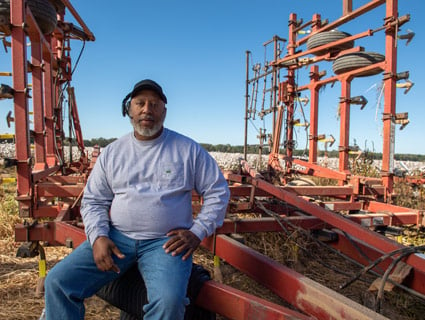Empowering women: 10 inspiring examples in food and agriculture
Read Time: 4 minutes
March 08, 2024
When it comes to our food system, women play a vital role.
Their contributions to food and agriculture, however, aren’t recognized evenly around the globe. Gender inequity creates barriers for women in agriculture and food production — before they even plant a seed or raise an animal.
Just look at the stats. For example, did you know …
- … women make up 43% of agricultural workers across the world, but only 20% own land?
- … women perform about half the agricultural labor in developing countries, yet produce roughly 20-30% less than men because of obstacles like unequal access to land, markets and resources?
- … only 30% of farmers in the U.S. are women?
Empowered women can help propel our food system forward. That's why achieving gender equity in food and agriculture is so important. In fact, if we achieve gender equity in agriculture, we could help reduce the number of hungry people in the world by 12-17%, according to the Food and Agriculture Organization of the United Nations — benefitting 100-150 million of the world’s population.
“With the challenges our industry is facing now, we can’t afford to leave anyone on the sidelines,” says Ruth Kimmelshue, senior vice president of Cargill’s animal nutrition business. “Everyone deserves a seat at the table.”
That’s why, at Cargill, we’re working across the communities where we live, the supply chains we operate and our workplaces to empower women. Below are 10 inspiring examples of advancing equity and women’s empowerment around the world in food and agriculture.
1. Expertise = empowerment for Africa's women-owned food processors
 We work with Partners in Food Solutions, a network of corporate volunteers that supports 2,300 small food companies in 11 African countries, to promote economic growth for food processors, many of which are owned or managed by women.
We work with Partners in Food Solutions, a network of corporate volunteers that supports 2,300 small food companies in 11 African countries, to promote economic growth for food processors, many of which are owned or managed by women.
Women are central to the success of Africa's food system: they own most smallholder farms and an increasing share of the continent’s growing food processing companies.
To support them, Cargill works with Partners in Food Solutions, a network of corporate volunteers that lend their technical and business expertise to more than 2,300 food processors, with a supply chain of 1.7 million smallholder farmers in 11 African countries.
Last year more than 100 of our employees shared their time and expertise to support 93 entrepreneurial food companies, 44% of which are women-owned or -managed businesses.
2. This is how a chicken can hatch hope for female farmers around the world
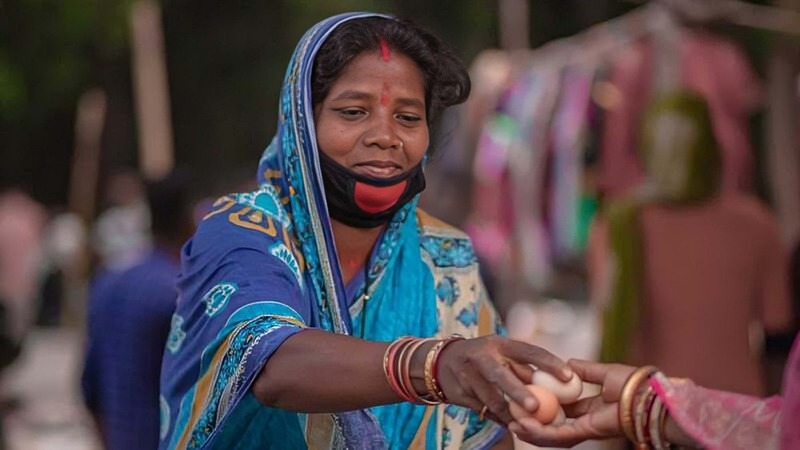 Cargill and Heifer International co-founded Hatching Hope in 2018 to increase the economic participation and livelihoods of farmers around the globe.
Cargill and Heifer International co-founded Hatching Hope in 2018 to increase the economic participation and livelihoods of farmers around the globe.
Raising chickens can lead to a brighter future for low-income livestock farmers around the world.
That's the goal of Hatching Hope, our partnership with Heifer International that uses poultry farming to improve the livelihoods of farmers — many of them women — in India, Kenya and Mexico.
The result: economic empowerment, sustainable development and improved nutrition and health for families and communities.
3. How to ensure 'She Thrives?’ More opportunities for training and education.
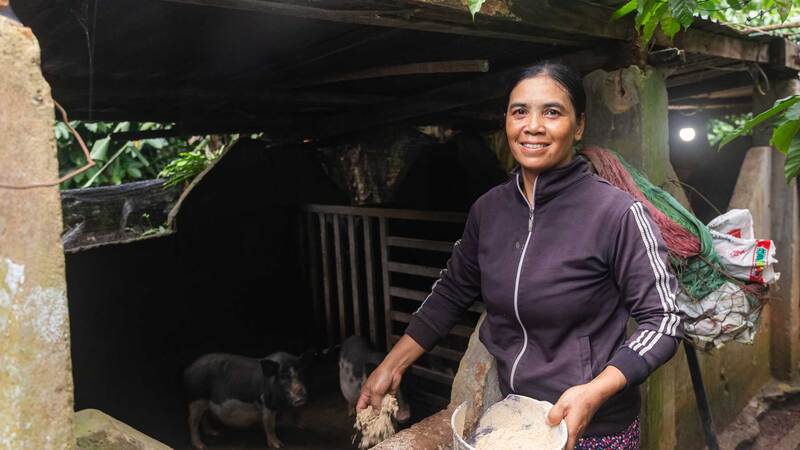 The She Thrives initiative in Vietnam aims to improve the livelihoods of Vietnam's rural smallholder farmers, particularly women and ethnic minorities.
The She Thrives initiative in Vietnam aims to improve the livelihoods of Vietnam's rural smallholder farmers, particularly women and ethnic minorities.
In parts of Vietnam, women and girls face limited access to education and formal training.
To empower women and girls, we're partnering with CARE International on the She Thrives initiative. By providing access to inclusive markets and productive resources, this equity initiative aims to improve the livelihoods of Vietnam's rural smallholder farmers — particularly women and ethnic minorities.
To date, we’ve reached 1,000 women across the Tay Nguyen region with agriculture, financial, digital and leadership skills training and the establishment of Village Savings and Loan Associations (VSLA). Over the next two years, the She Thrives program will impact over 15,000 people, including over 7,000 women from the province’s Buon Ho district.
4. We made a promise to empower women in Africa’s cocoa communities (and we're keeping it!)
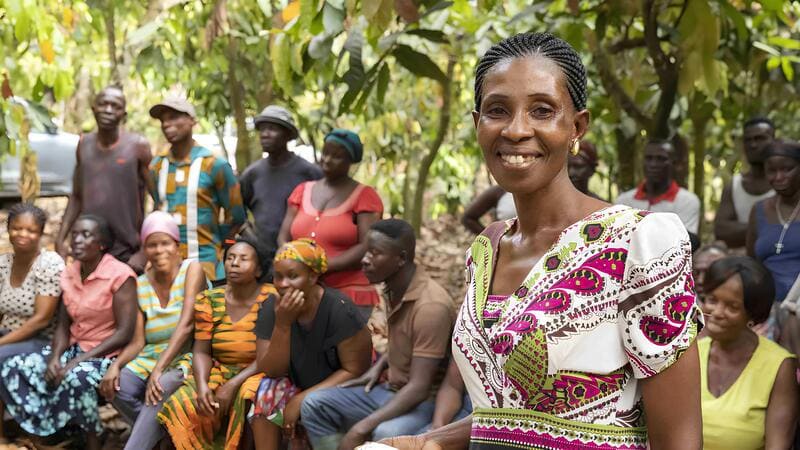 Cargill’s Cocoa Promise works to support farmers and their communities to achieve better incomes and living standards while growing cocoa sustainably. That includes female farmers, who represent nearly half of agricultural workers in Africa.
Empowered women lead to empowered cocoa communities. That’s one of many reasons why uplifting women is a key part of our Cocoa Promise.
Cargill’s Cocoa Promise works to support farmers and their communities to achieve better incomes and living standards while growing cocoa sustainably. That includes female farmers, who represent nearly half of agricultural workers in Africa.
Empowered women lead to empowered cocoa communities. That’s one of many reasons why uplifting women is a key part of our Cocoa Promise.
Women already play a significant role in cocoa-growing communities. However, their work represents only a tiny fraction of household income since they own less land and lack equal access to training, markets, resources or financing — and therefore lack equal opportunities.
That’s why the Cargill Cocoa Promise has contributed to creating 660 AVECs (VSLAs, or Village Savings & Loan Associations) involving nearly 20,000 women, mobilizing nearly $800 million in savings to start or develop an income-generating activity.
5. This is how livestock can lead to women's empowerment in rural Mexico
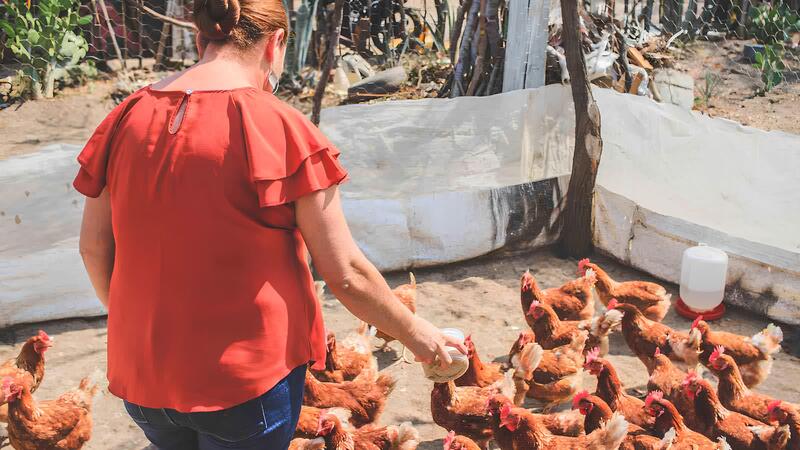 Our partnership with Pro Mujer in Jalisco, Mexico, is empowering 200 women farmers to produce chicken eggs as a new source of income.
Can chicken eggs lead to women's economic empowerment? That's the idea behind our project with women’s empowerment organization Pro Mujer.
Our partnership with Pro Mujer in Jalisco, Mexico, is empowering 200 women farmers to produce chicken eggs as a new source of income.
Can chicken eggs lead to women's economic empowerment? That's the idea behind our project with women’s empowerment organization Pro Mujer.
In Jalisco, Mexico, we've empowered 200 women farmers to use chicken eggs as a new way to earn income. So far, women farmers are caring for an additional 1,400 poultry since the program started.
6. We’re getting deep into the (sea)weeds of gender equity in Eastern Africa
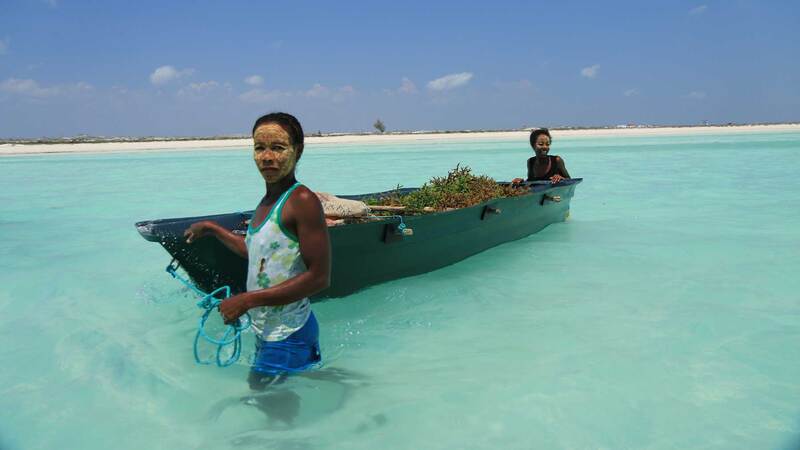 Cargill’s Red Seaweed Promise aims to help red seaweed producers — who are mostly women — to achieve better incomes and living standards.
Did you know that most farmers of red seaweed — used to produce the common food additive carrageenan — in countries like Madagascar and Tanzania are women?
Cargill’s Red Seaweed Promise aims to help red seaweed producers — who are mostly women — to achieve better incomes and living standards.
Did you know that most farmers of red seaweed — used to produce the common food additive carrageenan — in countries like Madagascar and Tanzania are women?
As part of our Red Seaweed Promise, we're training red seaweed farmers on sustainable practices, promoting gender equity and conserving marine habitats.
So far, 60% of trainees in Tanzania have been female.
7. This partnership helps teach women in Cameroon the business of agriculture
 One part of the Cargill Cocoa Promise? LadyAgri, a program promoting income diversification for women in Cameroon.
Across Cameroon, many women experience limited household incomes and resources — often attributed to low literacy, self-esteem and decision-making power.
One part of the Cargill Cocoa Promise? LadyAgri, a program promoting income diversification for women in Cameroon.
Across Cameroon, many women experience limited household incomes and resources — often attributed to low literacy, self-esteem and decision-making power.
To address this, we provide agribusiness training — from safe food practices to social entrepreneurship — as part of our partnership with LadyAgri. The goal? Help women raise higher quality produce and increase access to markets.
8. When it comes to uniforms, this woman-owned business is the right fit
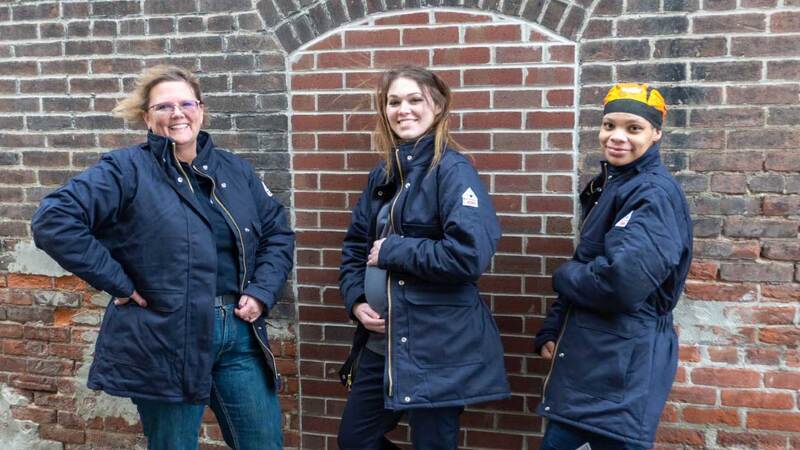 Operations uniforms haven't always been inclusive, especially for women. That is why we're purchasing from a woman-owned business to supply more inclusive uniforms to our teams.
… dare we even say a perfect fit? When it comes to working in operations, uniforms haven’t always accounted for people with varying body types — especially women.
Operations uniforms haven't always been inclusive, especially for women. That is why we're purchasing from a woman-owned business to supply more inclusive uniforms to our teams.
… dare we even say a perfect fit? When it comes to working in operations, uniforms haven’t always accounted for people with varying body types — especially women.
That’s why, through our supplier diversity efforts, we’re working with woman-owned apparel business Cosawove Workwear to supply more inclusive uniforms to women in some of our facilities.
9. This is what working to close the gender gap looks like inside our offices …
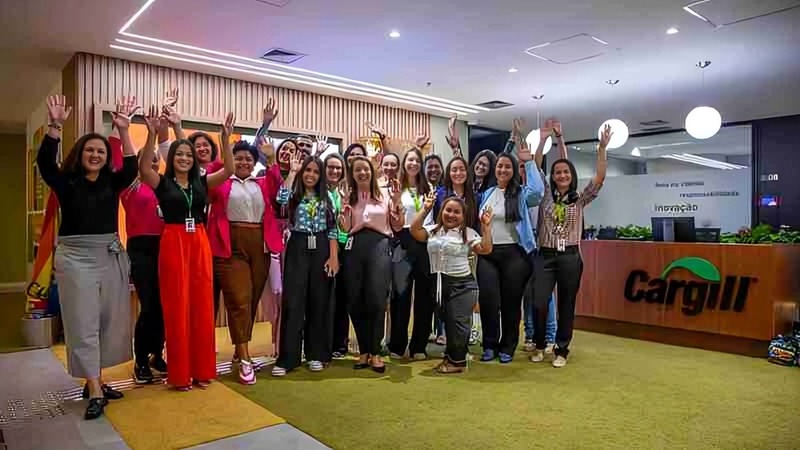 The Cargill Women's Network is one of eight Business Resource Groups comprising hundreds of Cargill employees across the globe.
The Cargill Women's Network is one of eight Business Resource Groups comprising hundreds of Cargill employees across the globe.
Fostering inclusion and gender equity happens inside our walls, too. Take, for example, our global Cargill Women’s Network, one of eight Business Resource Groups at Cargill.
The employee-led group empowers women who work at Cargill by building advocacy, sponsoring colleagues globally, and advancing our global gender parity commitments, such as equal rights and equal pay.
10. … and what women's empowerment looks like inside our production facilities.
 Our Global Women in Operations initiative is focused on supporting women who work in production facilities.
Our Global Women in Operations initiative is focused on supporting women who work in production facilities.
Women in the U.S. make up 47% of the workforce, but only 30% work in manufacturing.
Our Global Women in Operations is looking to close that gender gap by advancing gender parity in our facilities. For women colleagues around the world, that means more mentorship, more inclusive facilities (such as lactation rooms) and career progression.
 Uplifting women is not only the right thing to do; it's essential for understanding and meeting the needs of our diverse customer and supplier base, ensuring sustained success in today's dynamic marketplace.”
Uplifting women is not only the right thing to do; it's essential for understanding and meeting the needs of our diverse customer and supplier base, ensuring sustained success in today's dynamic marketplace.”
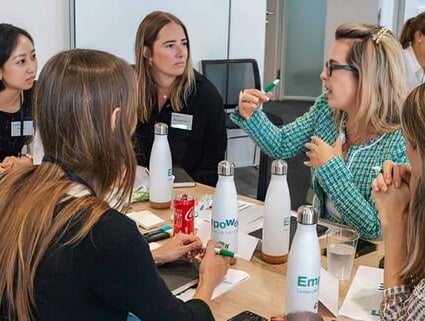
Outliers to leaders: The career journeys of women traders
Women have traditionally been underrepresented in trading. At Cargill, a generation of women traders is flourishing — and inspiring others.

Army captain to corporate leader: Meet Bethany May
Veterans and active-duty military members bring unique skills to Cargill. Learn how a former Army captain helps us manage risk.
‘Growing the future’: Working with Black farmers to advance equity
Through the Black Farmer Equity Initiative, Cargill is helping connect Black farmers in the U.S. with more equitable opportunities in agriculture.

